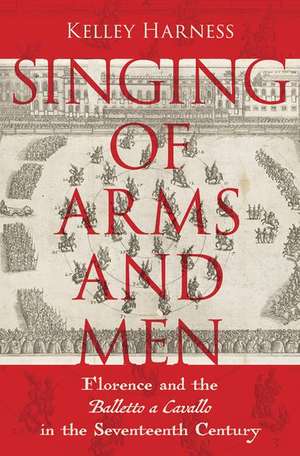Singing of Arms and Men: Florence and the Balletto a Cavallo in the Seventeenth Century
Autor Kelley Harnessen Limba Engleză Hardback – 19 dec 2024
Preț: 518.63 lei
Preț vechi: 741.09 lei
-30% Nou
Puncte Express: 778
Preț estimativ în valută:
99.27€ • 107.87$ • 83.44£
99.27€ • 107.87$ • 83.44£
Carte disponibilă
Livrare economică 20-26 martie
Preluare comenzi: 021 569.72.76
Specificații
ISBN-13: 9780197761595
ISBN-10: 0197761593
Pagini: 344
Ilustrații: 18 figures
Dimensiuni: 152 x 226 x 31 mm
Greutate: 0.64 kg
Editura: Oxford University Press
Colecția OUP USA
Locul publicării:New York, United States
ISBN-10: 0197761593
Pagini: 344
Ilustrații: 18 figures
Dimensiuni: 152 x 226 x 31 mm
Greutate: 0.64 kg
Editura: Oxford University Press
Colecția OUP USA
Locul publicării:New York, United States
Recenzii
Harness's highly original study of the horse ballet in Tuscany provides a rich introduction to the single most important musical genre for projecting Tuscan power in the seventeenth century. Deftly weaving insights from music, gender, and performance studies, she shows how these works sustained an image of the Tuscan state as a symbolically manly player on the world stage, and as a state whose bureaucratic class was exquisitely controlled by His Highness the Grand Duke. Brava, bravissima!
No genre of musical theater can rival equestrian ballet for its public display of power: it scaled the absolutist messages of opera and court ballet to super-sized dimensions, and by using horses as its medium, it foregrounded the military skills of aristocratic riders. Singing of Arms and Men is an indispensable study of ten Medician balletti a cavallo that leverages Harness's astonishing command of Florentine archives. Harness pairs nuanced analyses of libretti and music with thorough consideration of production challenges, expenses, and the lives and labor of all involved. A must-have for scholars of early modern festivity.
Harness's study of the Florentine equestrian ballet is not only an important and innovative contribution to musicology, but a model of how creative and interdisciplinary research can change the way we look at the cultural world of an earlier civilization. Employing a wide range of sources and methods, Harness reveals how the genre functioned, how these works were prepared and performed, and how they were utilized by the Medici to achieve their political and social goals.
No genre of musical theater can rival equestrian ballet for its public display of power: it scaled the absolutist messages of opera and court ballet to super-sized dimensions, and by using horses as its medium, it foregrounded the military skills of aristocratic riders. Singing of Arms and Men is an indispensable study of ten Medician balletti a cavallo that leverages Harness's astonishing command of Florentine archives. Harness pairs nuanced analyses of libretti and music with thorough consideration of production challenges, expenses, and the lives and labor of all involved. A must-have for scholars of early modern festivity.
Harness's study of the Florentine equestrian ballet is not only an important and innovative contribution to musicology, but a model of how creative and interdisciplinary research can change the way we look at the cultural world of an earlier civilization. Employing a wide range of sources and methods, Harness reveals how the genre functioned, how these works were prepared and performed, and how they were utilized by the Medici to achieve their political and social goals.
Notă biografică
Kelley Harness specializes in Florentine music and theater of the sixteenth and seventeenth centuries, situating the works she studies within broader social and artistic contexts. Much of her past scholarship has focused on women's patronage, including her book Echoes of Women's Voices: Music, Art, and Female Patronage in Early Modern Florence and articles dealing with musical representations of biblical women such as Judith and Saint Mary Magdalene. She is a past Editor-in-Chief of the Journal of Seventeenth-Century Music and is a member of the musicology faculty at the University of Minnesota.
